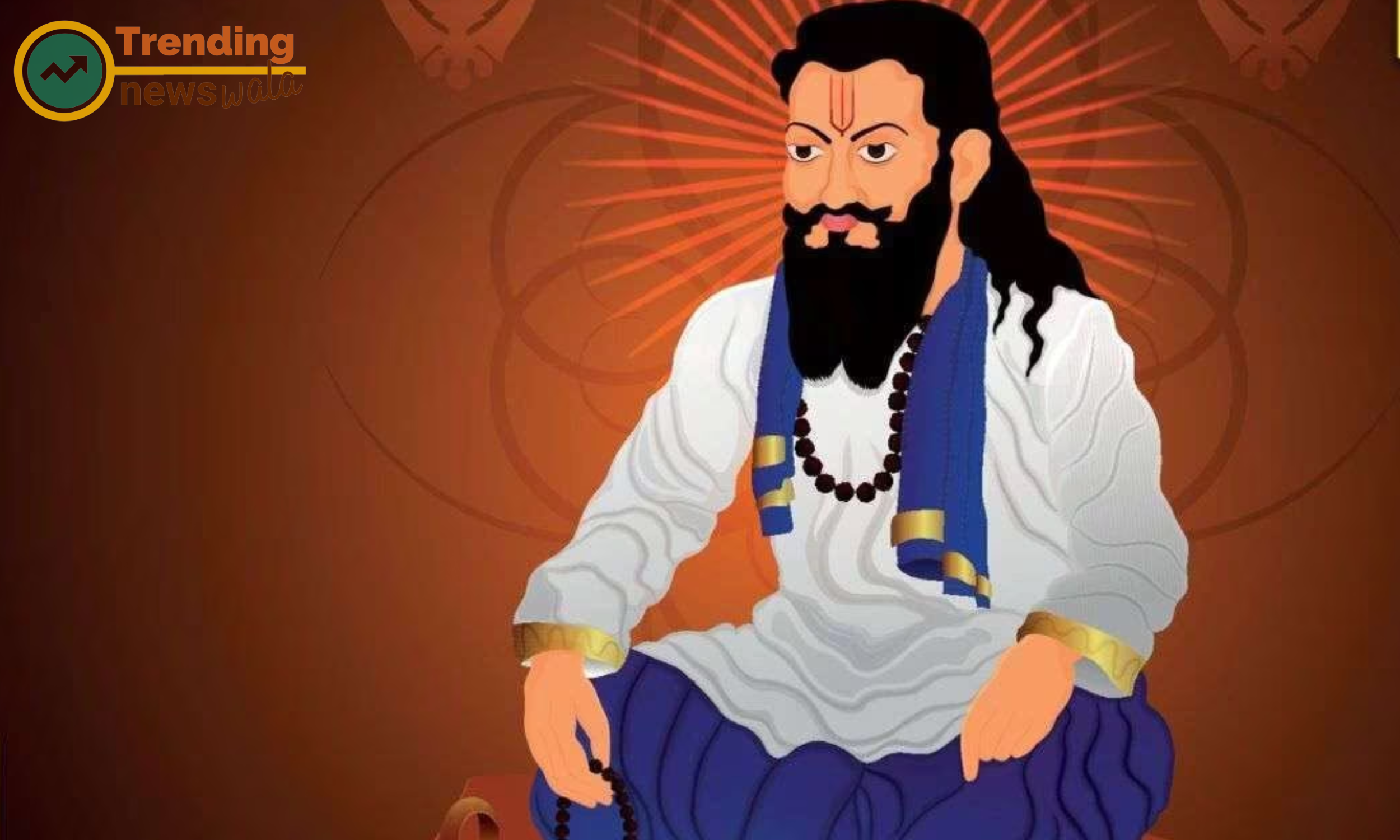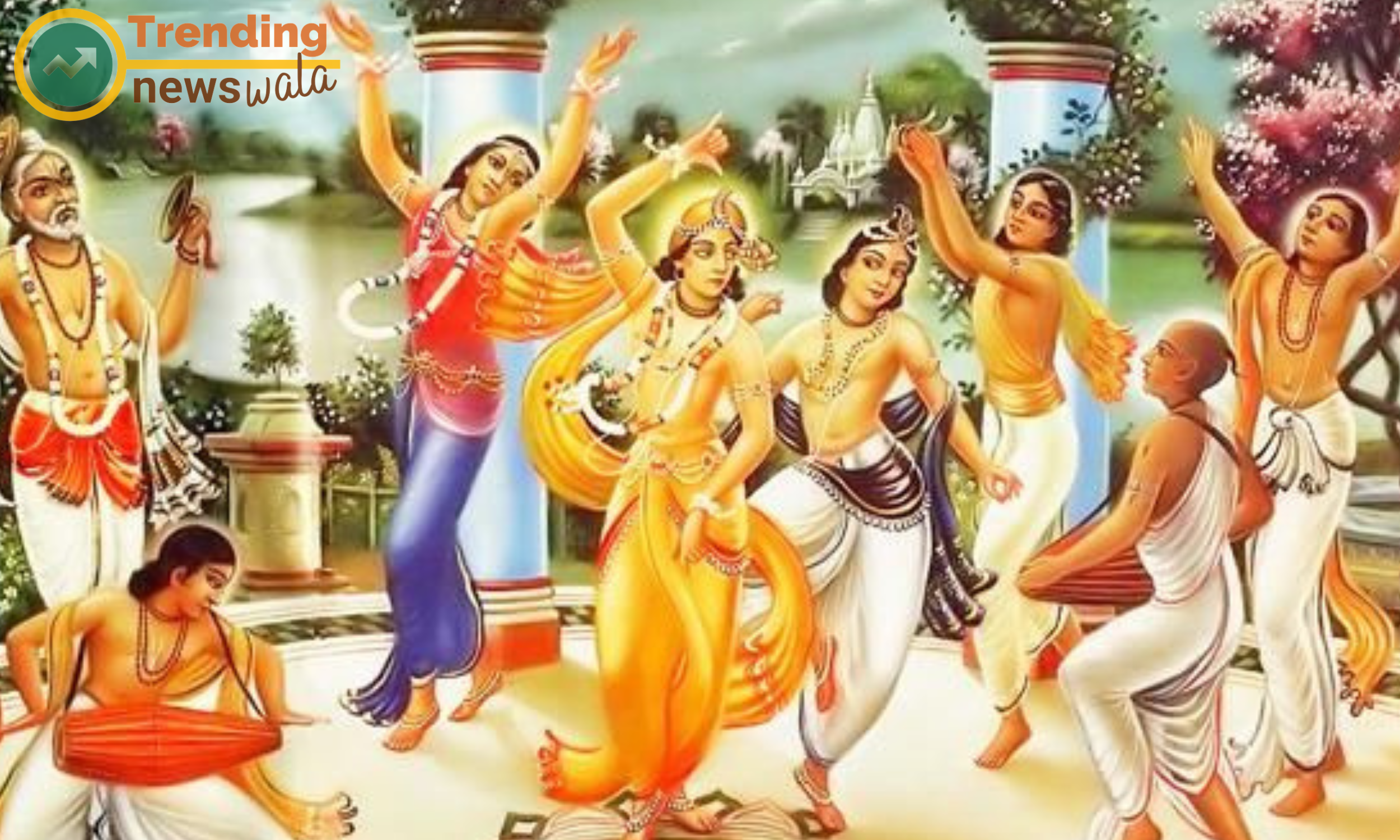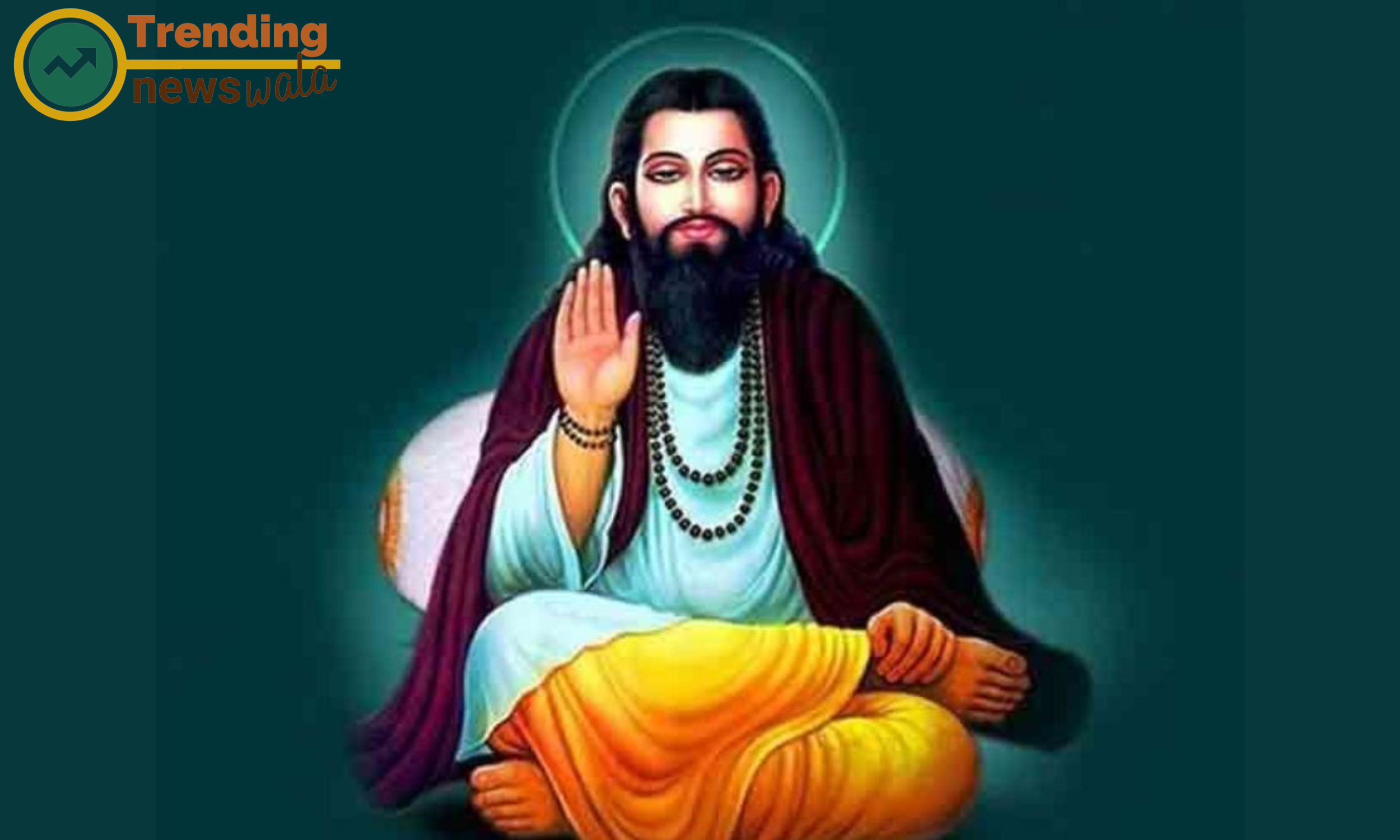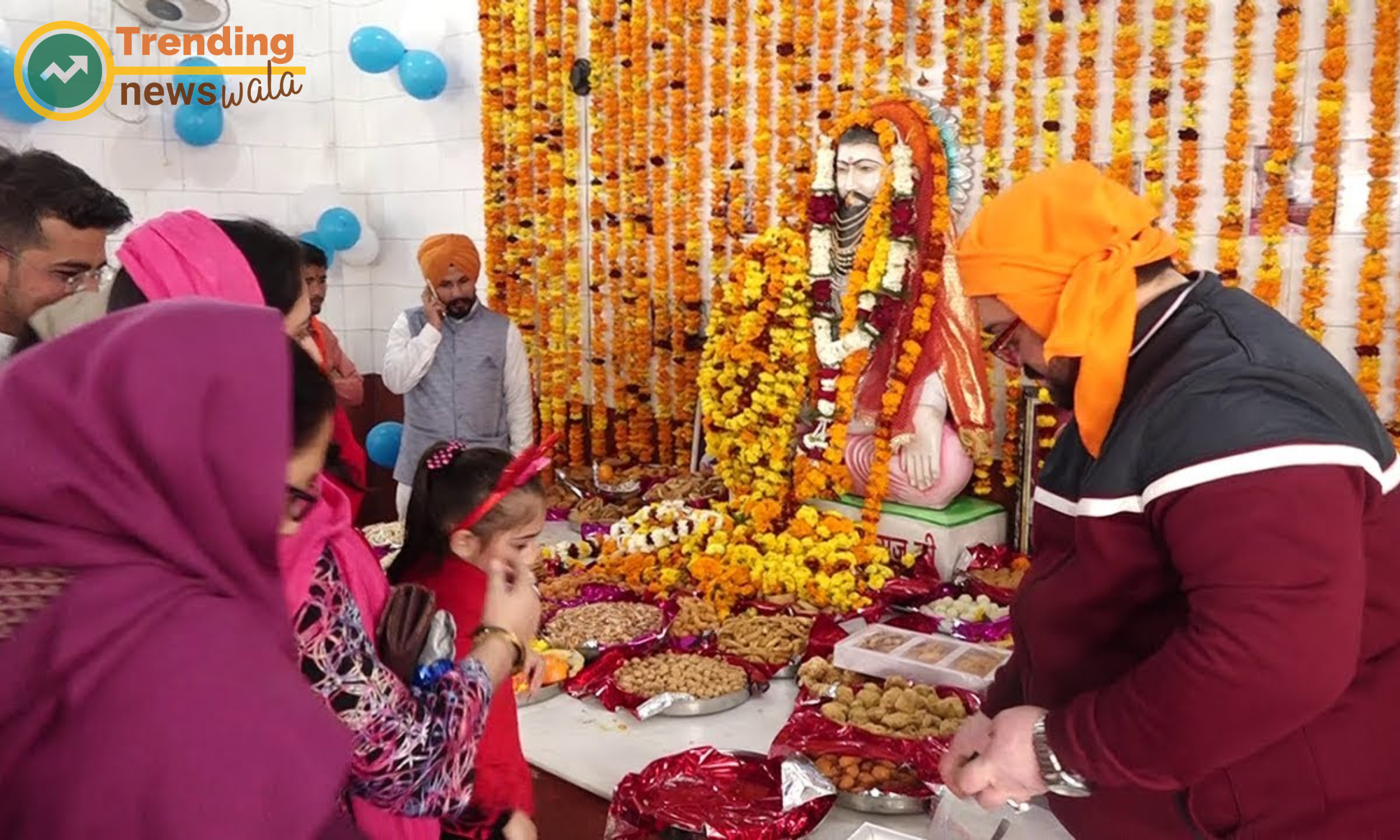Subscribe to Trending News Wala
Guru Ravidas Jayanti 2024 a joyous occasion marked by spiritual devotion communal unity and reflections on the profound teachings of the revered saint

Guru Ravidas Jayanti is an auspicious occasion celebrated to commemorate the birth anniversary of Guru Ravidas, a revered saint, poet, and spiritual luminary. Born on Magh Purnima in 1450 CE, Guru Ravidas devoted his life to spreading messages of love, equality, and devotion. As the world gears up to celebrate Guru Ravidas Jayanti in 2024, let us delve into the significance, teachings, and the spirit of this joyous occasion.
Guru Ravidas Jayanti in 2024 is a momentous occasion to pay homage to a spiritual luminary whose teachings transcend time and continue to guide humanity towards a path of love, equality, and devotion. As celebrations unfold, the essence of Guru Ravidas's wisdom permeates hearts, fostering a sense of unity, compassion, and reverence for the divine.
Today is also celebrated as Guru Ravidas Jayanti who was was the founder of the Ravidassia religion People celebrate this day by reading the holy book Amritbani Guru Ravidass Ji. Some devotees also take a holy bath in Ganga to celebrate this anniversary.

History of Guru Ravidas Jayanti
Guru Ravidas Jayanti commemorates the birth anniversary of Guru Ravidas, a revered saint, poet, and social reformer who made significant contributions to the spiritual and social fabric of India during the 15th century. The history of Guru Ravidas Jayanti is deeply rooted in the life and teachings of this influential figure. Here are more details about the history of Guru Ravidas Jayanti:
Early Life and Background: Guru Ravidas was born into a family traditionally associated with leatherwork, considered a lower caste occupation during that time. Despite his humble background, Ravidas displayed spiritual wisdom and a deep sense of devotion from a young age.
Spiritual Awakening: Ravidas's spiritual awakening occurred when he came into contact with Sant Kabir, another renowned saint of the Bhakti movement. Influenced by Kabir's teachings, Ravidas embarked on a path of devotion, renunciation, and social reform.
Social Reformer: Guru Ravidas was a vocal critic of the caste system and social inequalities prevalent in society. He advocated for the equality of all individuals, irrespective of their caste or social status. Ravidas emphasized that devotion to God was the true measure of a person's worth.
Literary Contributions: Guru Ravidas expressed his spiritual insights and devotion through poetry and hymns. His verses, known as "bhajans" or "shabads," are included in the Guru Granth Sahib, the holy scripture of Sikhism. Ravidas's writings focused on themes of divine love, humility, and the oneness of God.
Influence on Bhakti Movement: Guru Ravidas played a crucial role in the Bhakti movement, a medieval Hindu movement that emphasized personal devotion to a single, formless God. His teachings transcended religious boundaries and had a profound impact on the spiritual landscape of the time.
Legacy and Reverence: Guru Ravidas's legacy endures through his teachings and the establishments of Ravidas temples and Gurdwaras (Sikh places of worship) dedicated to his memory. His followers, known as Ravidasis, celebrate Guru Ravidas Jayanti as a day of spiritual reflection, prayer, and community gatherings.
Recognition Across Communities: While Guru Ravidas is especially revered by followers of Sikhism, his teachings have resonated across various religious and social communities. His emphasis on equality and devotion to God has found universal appeal.
In conclusion, the history of Guru Ravidas Jayanti is intertwined with the life and teachings of Guru Ravidas, a spiritual luminary who left an indelible mark on the socio-religious landscape of medieval India. The celebration of Guru Ravidas Jayanti serves as a reminder of his timeless wisdom and his enduring impact on the pursuit of spiritual truth and social justice.

Prayer Meetings and Kirtans
Prayer meetings and Kirtans are both forms of spiritual gatherings that are often associated with religious and devotional practices. However, they have distinct characteristics and purposes.
Prayer Meetings:
Definition: A prayer meeting is a gathering of individuals for the purpose of engaging in prayer, meditation, and spiritual reflection.
Purpose: Prayer meetings are organized to create a collective and focused environment for individuals to connect with a higher power, seek guidance, express gratitude, and share in communal spirituality.
Structure: The structure of a prayer meeting can vary depending on religious traditions. It may involve reciting scripted prayers, spontaneous prayers, reading sacred texts, and singing hymns. Some prayer meetings may also include teachings or sermons.
Kirtans:
Definition: Kirtan is a form of devotional singing or chanting in Hinduism and other Indian religions. It involves the repetition of sacred sounds, mantras, or names of deities.
Purpose: The primary purpose of kirtan is to invoke a sense of devotion and connection to the divine. It is considered a form of bhakti yoga, emphasizing the path of love and devotion to the divine.
Structure: Kirtans typically involve call-and-response singing, where a leader sings a line or verse, and the participants respond. The musical accompaniment often includes traditional instruments like harmonium, tabla, and other percussion instruments. The repetitive nature of the chants helps create a meditative and devotional atmosphere.
While both prayer meetings and kirtans share the common goal of fostering spiritual connection, they differ in their forms and practices. Prayer meetings are more general and can be found in various religious traditions, while kirtans are specific to certain cultural and religious contexts, particularly within Hinduism and related traditions. Additionally, kirtans often have a more musical and participatory aspect compared to the broader and potentially more structured nature of prayer meetings.

Teachings of Guru Ravidas
Guru Ravidas was a prominent saint, poet, and social reformer in the Bhakti movement in India during the 15th and 16th centuries. His teachings focused on spirituality, equality, and social justice. Here are some key aspects of Guru Ravidas's teachings:
Equality and Social Justice: Guru Ravidas strongly advocated for the equality of all human beings, regardless of their caste, creed, or social status. He rejected the hierarchical caste system and emphasized that everyone is equal in the eyes of the divine.
Devotion to God: Central to Guru Ravidas's teachings was the idea of devotion (bhakti) to the Supreme Being. He stressed the importance of a personal and loving connection with God through prayer, meditation, and selfless service.
Rejecting Rituals and Hypocrisy: Guru Ravidas criticized empty rituals and formalities that lacked genuine devotion and moral conduct. He emphasized the need for sincere, heartfelt worship and rejected external practices that did not lead to inner spiritual transformation.
Oneness of God: Guru Ravidas believed in the oneness of God and rejected any form of idol worship or polytheism. He emphasized that God is beyond any particular religion or sect and is accessible to all who seek Him with sincerity.
Serving Humanity: Social service and compassion towards fellow human beings were integral to Guru Ravidas's teachings. He advocated for selfless service, helping the needy, and treating all individuals with kindness and respect.
Spiritual Equality of Women: Guru Ravidas challenged societal norms that marginalized women. He advocated for the spiritual equality of women and emphasized that they, too, could attain spiritual enlightenment through devotion and righteous living.
Universal Brotherhood: Guru Ravidas promoted the idea of universal brotherhood, transcending barriers of caste, religion, and social status. He envisioned a society where people lived in harmony and mutual respect.
Power of Naam Simran (Chanting God's Name): Like many Bhakti saints, Guru Ravidas emphasized the practice of Naam Simran, which involves repeating or chanting the name of God. He believed that this practice could lead to spiritual awakening and union with the divine.
Guru Ravidas's teachings continue to inspire people, and his hymns are included in the Guru Granth Sahib, the holy scripture of Sikhism. His message of equality, devotion, and social justice remains relevant and influential across different communities in India.

Birth of Guru Ravidas
While the historical details about the birth of Guru Ravidas are not extensively documented, there are several traditional accounts and legends surrounding his birth. Guru Ravidas is believed to have been born around the 15th century, and he is considered a revered figure in Sikhism and other Indian spiritual traditions. Here is a general overview of the traditional narrative surrounding the birth of Guru Ravidas:
Place of Birth: Guru Ravidas is believed to have been born in the city of Varanasi, also known as Banaras or Kashi, situated on the banks of the Ganges River in present-day Uttar Pradesh, India.
Family Background: According to the traditional accounts, Guru Ravidas was born into a family of the Chamar community. During his time, the Chamar community was considered to be of a lower social status, facing discrimination based on the caste system prevalent in medieval India.
Miraculous Birth: Legends describe Guru Ravidas's birth as a miraculous event. It is said that he was born at dawn on the banks of the Ganges River. Some accounts suggest that during his birth, the atmosphere was filled with divine light and auspicious signs.
Parentage: Guru Ravidas's parents are said to be Santokh Das and Kalsa Devi. Despite their lower social status, they were devout Hindus. Guru Ravidas's birth is often seen as a divine intervention to uplift the spiritual consciousness of society.
Early Life: From an early age, Guru Ravidas is believed to have shown a deep interest in spirituality and a longing for a profound connection with the divine. His rejection of social norms related to caste and his emphasis on the equality of all individuals became prominent aspects of his teachings.
Occupation: Traditionally, the Chamar community was associated with occupations like leatherworking. Guru Ravidas, too, engaged in his family's trade, but he used his work as a means to convey spiritual messages, humility, and service.
While the exact details may vary in different retellings and traditions, the overarching theme remains consistent—that Guru Ravidas was born into humble circumstances and emerged as a revered spiritual figure, challenging social inequalities and emphasizing devotion to the divine.
Guru Ravidas's teachings continue to inspire followers, and his hymns and poetry, collected in the Guru Granth Sahib, carry significant spiritual and philosophical weight in Sikhism. His birth anniversary is celebrated as Guru Ravidas Jayanti by his followers.

Celebration of Guru Ravidas Jayanti
Guru Ravidas Jayanti is the annual celebration of the birth anniversary of Guru Ravidas, a revered saint and poet in Indian spiritual traditions. It is observed with great enthusiasm by followers of Guru Ravidas, particularly in the Sikh community and among various other groups who venerate him. Here are some details about the celebration of Guru Ravidas Jayanti:
Date: Guru Ravidas Jayanti is observed on the full moon day in the month of Magh, which usually falls in January or February of the Gregorian calendar. The date may vary slightly each year based on the lunar calendar.
Religious Observances: Devotees and followers gather at temples and gurdwaras (Sikh places of worship) to offer prayers, sing hymns, and listen to discourses on the life and teachings of Guru Ravidas. Special kirtans (devotional songs) and recitation of Guru Ravidas's hymns are integral parts of the celebration.
Processions: Processions or Nagar Kirtans may be organized, where devotees carry the Guru Granth Sahib, the holy scripture of Sikhism, and portraits or images of Guru Ravidas through the streets. These processions are often accompanied by singing, chanting, and the display of martial arts skills.
Community Service: As a tribute to Guru Ravidas's emphasis on social service, many devotees engage in community service activities on this day. This may include organizing free medical camps, distributing food to the needy, and participating in cleanliness drives.
Feasts and Langar: Langar, the community kitchen where free meals are served to all, is an integral part of Sikh tradition. On Guru Ravidas Jayanti, special langars are organized, and devotees, regardless of their background, participate in the communal meal, symbolizing equality and unity.
Discussions and Seminars: Religious and educational institutions may organize discussions, seminars, and lectures on the life, teachings, and philosophy of Guru Ravidas. Scholars and spiritual leaders may share insights into the relevance of Guru Ravidas's messages in contemporary times.
Cultural Programs: Cultural programs, including plays, music performances, and art exhibitions, may be organized to showcase the artistic and cultural aspects related to Guru Ravidas's life and teachings.
Reading of Bani (Scriptures): Devotees often engage in the reading and recitation of Guru Ravidas's bani (poetry and hymns), emphasizing the spiritual and devotional aspects of his teachings.
Guru Ravidas Jayanti serves as an occasion for spiritual reflection, community bonding, and acts of kindness and service. It provides an opportunity for people to come together, irrespective of their backgrounds, to celebrate the teachings of Guru Ravidas and strive for a more equitable and compassionate society.
Writer and content creator
Log in to share your thoughts and engage with other readers.